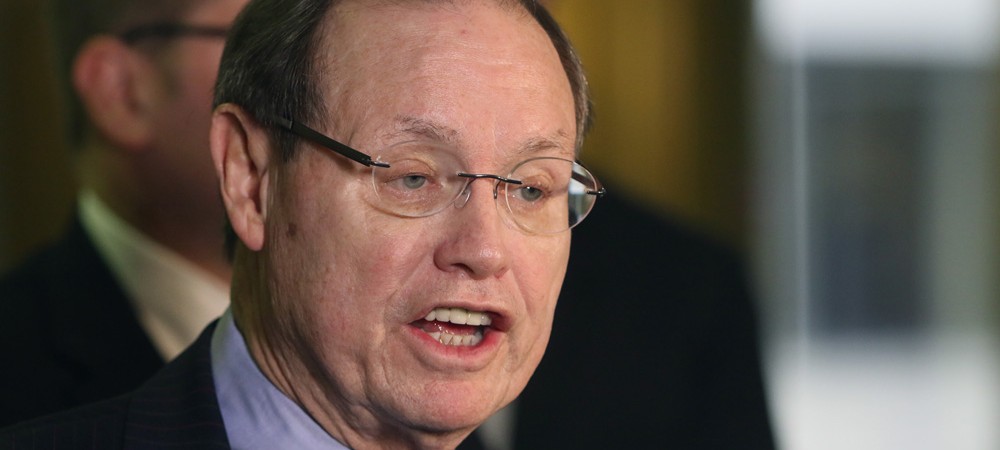
Special prosecutor Dan K. Webb argues that anything his staff turned up is secret because he was running a grand jury investigation — even material that wasn't presented to grand jurors. | Sun-Times files
Probes done, but records stay sealed
Published Feb. 25, 2016
By TIM NOVAK, CHRIS FUSCO and CAROL MARIN
Staff Reporters
The investigations of David Koschman’s death are over: Former Mayor Richard M. Daley’s nephew is on probation for involuntary manslaughter, four cops have retired to avoid punishment for their roles in the case, and two others are fighting suspensions.
But thousands of pages of evidence remain walled off from public view under the state’s grand-jury protection law, including statements from Daley and his relatives.
Dan K. Webb, the Koschman special prosecutor, won’t say whether he’ll ever ask Cook County Circuit Judge Michael Toomin to unseal the records and allow the public to see evidence he gathered involving two botched police investigations of the case.
Webb says he can’t say because he’s fighting the Better Government Association, which is suing him, Mayor Rahm Emanuel’s office and the city’s law and police departments to obtain documents including subpoenas Webb served on the city.
State law bars releasing grand jury material. But Webb could seek a waiver from Toomin to do so.
“We strongly support any and all efforts to obtain the public release of the records from the long-completed grand jury investigation into the unjustified killing of David Koschman and the coverup that followed,” said G. Flint Taylor and Locke Bowman, attorneys for David Koschman’s mother, Nanci Koschman. “We urge Dan Webb to petition the court for that release.”
Usually, grand jury material gets released when a case goes to trial. But there was no trial in Koschman’s death because Daley nephew Richard J. “R.J.” Vanecko pleaded guilty in January 2014.
Though unusual, there are cases where grand jury material has been released even when no charges are filed — notably the St. Louis County prosecutor’s decision to release records in the death of Michael Brown, the unarmed black teenager killed by a white cop in Ferguson, Mo.
The Koschman records would reveal the names of all 146 people Webb interviewed and what they said.
They include Vanecko’s cellphone records and testimony of his friends who lied to the police and also would show what Daley and his family members told Webb. Daley and his relatives gave written statements that were read to grand jurors.
Citing state law and a Toomin order, Webb and City Hall refused to provide any documents to the BGA. But Cook County Judge Mary Mikva has ruled in that case that Toomin’s order was too broad and that subpoenas and emails between City Hall and Webb’s team should be public. City attorneys said last week they will ask Toomin if they can release those.
Mikva also ruled the state’s Grand Jury Secrecy Act prevents Webb from providing other records the BGA wants.
Nearly a month after Mikva’s Dec. 17, 2015, ruling, Emanuel’s top lawyer, Stephen Patton, hired Webb and his firm, Winston & Strawn, to review the law department’s federal civil-rights litigation division after a federal judge ordered a new trial in an unrelated case in which a city attorney concealed evidence from a jury that refused to award damages to the family of a man killed by two Chicago cops.
U.S. District Judge Edmond Chang’s ruling raised questions about whether the law department was protecting a police department under fire for covering up police misconduct.
If Webb finds wrongdoing by the law department, he’ll report that to City Hall Inspector General Joseph Ferguson, who assisted in the Koschman investigation.
Koschman, 21, died in May 2004, 11 days after being punched by Vanecko, who ran off. The case remained an unsolved homicide until 2011, when the Chicago Sun-Times asked to see case files. That prompted the police to close the case without charging Daley’s nephew.
A series of Sun-Times stories revealed inconsistencies in the department’s 2004 and 2011 investigations. At Koschman’s mother’s request, Toomin appointed a special prosecutor, Webb, who convened the grand jury that indicted Vanecko.
Toomin has allowed the limited release of grand jury material, including a 162-page report he ordered Webb to produce.
Toomin gave Ferguson permission to include some grand jury material in a report that recommended firing or suspending six officers involved in the 2011 reinvestigation.
On Feb. 9, Toomin released transcripts of grand-jury testimony and summaries of interviews from a dozen members of the police department so they could be used by the law firm City Hall hired to handle disciplinary cases before the Chicago Police Board.
Those transcripts were to become public if ever “filed before the police board.” But it’s unclear whether that will happen. Four cops retired and, as a result, disciplinary charges against them had to be dropped. Two more are fighting one-year suspensions.
Carol Marin is an NBC5 reporter.




